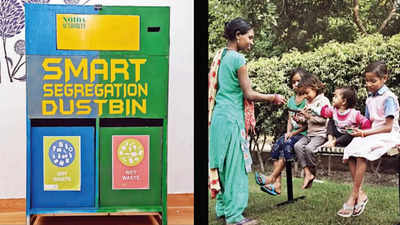- News
- City News
- noida News
- Noida: Smart bin, gadget to spot overflowing sewers ace Swachh contest
Trending
This story is from January 27, 2022
Noida: Smart bin, gadget to spot overflowing sewers ace Swachh contest
A gadget that blows the whistle on overflowing sewers, a smart dustbin with an object-detection sensor to segregate dry waste from wet, products made out of recycled household waste like chips packets and shampoo bottles — altruistic projects applying technology to big, societal problems

A dustbin to separate wet waste from dry and a bench made with recycled plastic (right) earned accolades at the challenge
NOIDA: A gadget that blows the whistle on overflowing sewers, a smart dustbin with an object-detection sensor to segregate dry waste from wet, products made out of recycled household waste like chips packets and shampoo bottles — altruistic projects applying technology to big, societal problems earned accolades at the Noida Authority’s Swachh Innovative Technology Challenge.
The contest, held on January 1, saw a total of 154 submissions in five categories — social inclusion, zero dump, plastic waste management, transparency, and liquid waste management.
A gadget developed by a student of Amity University, Rajat Tyagi, sought to redress a problem that has vexed residents for years — overflowing sewers. The Sector 134 resident combined information and communication technologies (ICT) to develop a sewer overflow monitoring tool that aced the liquid waste management category of the awards.
“I belong to Uttarakhand and when I came to Noida, I got a first-hand experience of living in a planned city. While I fell in love with the city, I noticed overflow sewers, mainly in rural areas, was a major nuisance. So, I thought of making an ICT-based sewer overflow monitoring tool,” Tyagi told TOI.
Pivoting on zero waste, Sector 128-resident
“Segregation of domestic and commercial waste remains a large problem and my aim was to design a dustbin that is equipped with waste-detection technology, which can identify the type of garbage and then segregate it. The SSD was tested at various public places, like parks, society complexes, etc and the results were successful,” he said. Kumar was awarded the first prize in the ‘zero dump’ category.
Piling plastic though not primarily a tech problem, but building a healthier ecosystem is and Sector 12-resident Raghav Sharma took up the challenge to create public utility products like a bench, bin and home décor items by recycling plastic waste such as chips packaging, shampoo bottles, and polythene.
Sharma, who bagged the second prize in the plastic waste management category in the contest, said: “My objective was to utilise various kinds of plastic wastes and develop recycled products that can be used on a daily basis.”
According to the Noida Authority, all participants will be given digital certificates; the winners will be rewarded cash prizes of Rs 51,000, Rs 31,000 and Rs 21,000 for first, second and third positions, respectively, on January 31.
The contest, held on January 1, saw a total of 154 submissions in five categories — social inclusion, zero dump, plastic waste management, transparency, and liquid waste management.
A gadget developed by a student of Amity University, Rajat Tyagi, sought to redress a problem that has vexed residents for years — overflowing sewers. The Sector 134 resident combined information and communication technologies (ICT) to develop a sewer overflow monitoring tool that aced the liquid waste management category of the awards.
“I belong to Uttarakhand and when I came to Noida, I got a first-hand experience of living in a planned city. While I fell in love with the city, I noticed overflow sewers, mainly in rural areas, was a major nuisance. So, I thought of making an ICT-based sewer overflow monitoring tool,” Tyagi told TOI.
So how does it work? According to Tyagi, the device sets off an alarm to the monitoring cells with information like time, date, location, etc whenever it detects overflow in sewers or drains. “Each device comes with a unique location tag, which will help the monitoring units to locate the device and thus drain the overflowing sewer. The device can also control the flow pumps at sewage pumping stations,” Tyagi added.
Pivoting on zero waste, Sector 128-resident
Nikhil Kumar has come up with a smart segregation dustbin (SSD) that has figured out a way to separate wet waste from dry. Ultrasonic sensors, Kumar said, installed in the dustbin allows it to detect human presence. Once opened, it triggers a direct current motor that also allows the user to throw the waste with zero contact. Once the waste is dumped, a loop inside the bin moves via an object-detection sensor which also determines if the waste is wet or dry. A moisture sensor then determines the direction of waste deflection while a servo motor initiates the segregation flap.
“Segregation of domestic and commercial waste remains a large problem and my aim was to design a dustbin that is equipped with waste-detection technology, which can identify the type of garbage and then segregate it. The SSD was tested at various public places, like parks, society complexes, etc and the results were successful,” he said. Kumar was awarded the first prize in the ‘zero dump’ category.
Piling plastic though not primarily a tech problem, but building a healthier ecosystem is and Sector 12-resident Raghav Sharma took up the challenge to create public utility products like a bench, bin and home décor items by recycling plastic waste such as chips packaging, shampoo bottles, and polythene.
Sharma, who bagged the second prize in the plastic waste management category in the contest, said: “My objective was to utilise various kinds of plastic wastes and develop recycled products that can be used on a daily basis.”
According to the Noida Authority, all participants will be given digital certificates; the winners will be rewarded cash prizes of Rs 51,000, Rs 31,000 and Rs 21,000 for first, second and third positions, respectively, on January 31.
End of Article
FOLLOW US ON SOCIAL MEDIA










